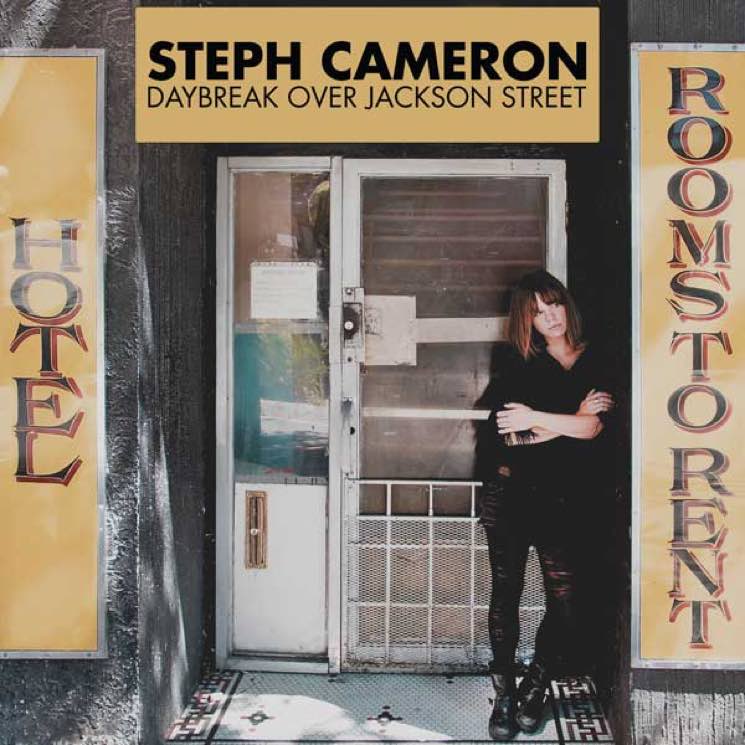Steph Cameron's Sad-Eyed Lonesome Lady was a bit of a fluke; the Saskatoon-based songwriter (she was then living in BC) had gone into Revolution Recording in Toronto to record a demo, and walked out three days later with a bare-bones breakthrough of a debut.
While Sad-Eyed Lonesome Lady captured a spontaneous outpouring of song and a flurry of guitar notes that Cameron had been playing live for years, its followup, her sophomore album Daybreak Over Jackson Street, is a far more considered, reflective, varied and subdued affair. Cameron still sounds indebted to '60s folk heroes like early Bob Dylan, but while Sad-Eyed Lonesome Lady often brimmed with in-the-moment energy, Daybreak is about maturing, taking a longer view, looking forward and looking back.
One of the things Cameron is reflecting on is her formative years working and living in Vancouver's Downtown Eastside. On "Daybreak Over Jackson Street," she paints a bleak picture of early morning, as people are leaving the shelters. She addresses institutionalized injustice, singing: "It sets the slope for souls to slip at daybreak over Jackson Street." On "Richard," her reminiscing is more personal; time passes and not everyone is able to move on.
But more generally, Daybreak marks the moment when you suddenly feel wistfully old in your late twenties, as on "Young and Living Free," with its lovely fingerpicked guitar patterns and the new polished weariness in Cameron's voice, and on "Sing For Me," when she sings, "Then like a dream with no goodbyes / I was looking through a woman's eyes."
We get hints of Sad-Eyed Lonesome Lady-era Cameron, particularly on breezy and bluesy "On My Mind" (it's about a cocaine habit and ends with a free little blast of harmonica) but musically, even though Cameron remains solo, Daybreak seems focused on expanding her stylistic palette. Among other things, it includes: hints of intricate early Leonard Cohen-style guitar ("That's What Love Is"); an almost-kids song about the circle of giving and receiving kindness ("Little Blue Bird"); and old-school blues ("Peace Is Hard to Find").
It's not as consistent or coherent as Sad-Eyed Lonesome Lady, but Daybreak's best moments suggest exciting new directions: the beautiful, Laurel Canyon-esque "Winterwood" ("Picking up your lover's laugh and putting it back down," is a great line), the more contemporary/poppy "California," where Cameron experiments to good effect with self-harmonizing, and "You Oughta Know By Now," a kiss-off of a country song with a chorus melody of the calibre of a Gordon Lightfoot or Gene MacLellan classic.
(Pheromone)While Sad-Eyed Lonesome Lady captured a spontaneous outpouring of song and a flurry of guitar notes that Cameron had been playing live for years, its followup, her sophomore album Daybreak Over Jackson Street, is a far more considered, reflective, varied and subdued affair. Cameron still sounds indebted to '60s folk heroes like early Bob Dylan, but while Sad-Eyed Lonesome Lady often brimmed with in-the-moment energy, Daybreak is about maturing, taking a longer view, looking forward and looking back.
One of the things Cameron is reflecting on is her formative years working and living in Vancouver's Downtown Eastside. On "Daybreak Over Jackson Street," she paints a bleak picture of early morning, as people are leaving the shelters. She addresses institutionalized injustice, singing: "It sets the slope for souls to slip at daybreak over Jackson Street." On "Richard," her reminiscing is more personal; time passes and not everyone is able to move on.
But more generally, Daybreak marks the moment when you suddenly feel wistfully old in your late twenties, as on "Young and Living Free," with its lovely fingerpicked guitar patterns and the new polished weariness in Cameron's voice, and on "Sing For Me," when she sings, "Then like a dream with no goodbyes / I was looking through a woman's eyes."
We get hints of Sad-Eyed Lonesome Lady-era Cameron, particularly on breezy and bluesy "On My Mind" (it's about a cocaine habit and ends with a free little blast of harmonica) but musically, even though Cameron remains solo, Daybreak seems focused on expanding her stylistic palette. Among other things, it includes: hints of intricate early Leonard Cohen-style guitar ("That's What Love Is"); an almost-kids song about the circle of giving and receiving kindness ("Little Blue Bird"); and old-school blues ("Peace Is Hard to Find").
It's not as consistent or coherent as Sad-Eyed Lonesome Lady, but Daybreak's best moments suggest exciting new directions: the beautiful, Laurel Canyon-esque "Winterwood" ("Picking up your lover's laugh and putting it back down," is a great line), the more contemporary/poppy "California," where Cameron experiments to good effect with self-harmonizing, and "You Oughta Know By Now," a kiss-off of a country song with a chorus melody of the calibre of a Gordon Lightfoot or Gene MacLellan classic.
